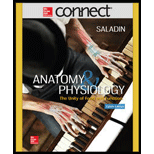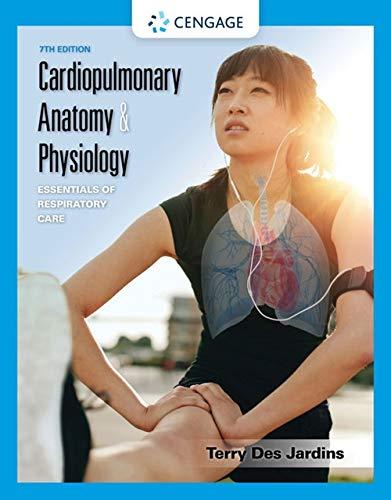
CONNECT ACCESS CARD FOR ANATOMY AND PHYSIOLOGY
8th Edition
ISBN: 9781259880193
Author: SALADIN
Publisher: MCGRAW-HILL HIGHER EDUCATION
expand_more
expand_more
format_list_bulleted
Concept explainers
Question
Chapter 5.4, Problem 1AYLO
Summary Introduction
To discuss:
The reason for considering nervous and muscular tissues are excitable tissue, even though excitability is a property of all living cells.
Introduction:
Humans and animals are the complex organisms made up of collection of cells to perform specific functions. These collection of cells are often called the tissues. Tissues arise from the embryonic origin that perform a specific physiological and structural role in an organ. Tissues perform specific functions, such as nerve signaling and nutrient digestion. There are four types of primary tissues, namely epithelial, connective, nervous, and muscular tissues.
Expert Solution & Answer
Want to see the full answer?
Check out a sample textbook solution
Students have asked these similar questions
State the five functions of Globular Proteins, and give an example of a protein for each function.
Diagram of check cell under low power and high power
a couple in which the father has the a blood type and the mother has the o blood type produce an offspring with the o blood type, how does this happen? how could two functionally O parents produce an offspring that has the a blood type?
Chapter 5 Solutions
CONNECT ACCESS CARD FOR ANATOMY AND PHYSIOLOGY
Ch. 5.1 - Classify each of the following into one of the...Ch. 5.1 - What are tissues composed of in addition to cells?Ch. 5.1 - Prob. 3BYGOCh. 5.1 - Prob. 4BYGOCh. 5.1 - Two names for the branch of biology concerned with...Ch. 5.1 - Prob. 2AYLOCh. 5.1 - The roles of cells, matrix, fibers, and ground...Ch. 5.1 - Primary germ layers of the embryo and their...Ch. 5.1 - Prob. 5AYLOCh. 5.2 - Distinguish between simple and stratified...
Ch. 5.2 - Prob. 6BYGOCh. 5.2 - Prob. 7BYGOCh. 5.2 - Prob. 8BYGOCh. 5.2 - Prob. 1AYLOCh. 5.2 - Prob. 2AYLOCh. 5.2 - 5.2 Epithelial Tissue 3. Defining characteristics...Ch. 5.2 - Prob. 4AYLOCh. 5.2 - Prob. 5AYLOCh. 5.2 - Prob. 6AYLOCh. 5.2 - Prob. 7AYLOCh. 5.2 - Prob. 8AYLOCh. 5.2 - Prob. 9AYLOCh. 5.3 - What features do most or all connective tissues...Ch. 5.3 - Prob. 10BYGOCh. 5.3 - Prob. 11BYGOCh. 5.3 - Prob. 12BYGOCh. 5.3 - Discuss the difference between dense regular and...Ch. 5.3 - Prob. 14BYGOCh. 5.3 - Prob. 15BYGOCh. 5.3 - Prob. 1AYLOCh. 5.3 - Prob. 2AYLOCh. 5.3 - Prob. 3AYLOCh. 5.3 - Prob. 4AYLOCh. 5.3 - Prob. 5AYLOCh. 5.3 - 5.3 Connective Tissue 6. The appearance,...Ch. 5.3 - Prob. 7AYLOCh. 5.3 - Prob. 8AYLOCh. 5.3 - Prob. 9AYLOCh. 5.3 - Prob. 10AYLOCh. 5.3 - 5.3 Connective Tissue 11. Why blood is classified...Ch. 5.4 - Prob. 16BYGOCh. 5.4 - Prob. 17BYGOCh. 5.4 - Prob. 18BYGOCh. 5.4 - Prob. 1AYLOCh. 5.4 - Prob. 2AYLOCh. 5.4 - Prob. 3AYLOCh. 5.4 - 5.4 Nervous and Muscular TissuesExcitable Tissues...Ch. 5.4 - Prob. 5AYLOCh. 5.5 - Prob. 19BYGOCh. 5.5 - Prob. 20BYGOCh. 5.5 - Prob. 21BYGOCh. 5.5 - Prob. 22BYGOCh. 5.5 - Prob. 23BYGOCh. 5.5 - Prob. 1AYLOCh. 5.5 - Prob. 2AYLOCh. 5.5 - Prob. 3AYLOCh. 5.5 - Prob. 4AYLOCh. 5.5 - Prob. 5AYLOCh. 5.5 - Prob. 6AYLOCh. 5.5 - Prob. 7AYLOCh. 5.5 - 5.5 Cell Junctions, Glands, and Membranes 8....Ch. 5.5 - 5.5 Cell Junctions, Glands, and Membranes 9....Ch. 5.5 - Prob. 10AYLOCh. 5.6 - Distinguish between differentiation and...Ch. 5.6 - Prob. 25BYGOCh. 5.6 - Prob. 26BYGOCh. 5.6 - Distinguish between regeneration and fibrosis....Ch. 5.6 - Prob. 1AYLOCh. 5.6 - Prob. 2AYLOCh. 5.6 - 5.6 Tissue Growth, Development, Repair, and...Ch. 5.6 - Prob. 4AYLOCh. 5.6 - Prob. 5AYLOCh. 5.6 - Prob. 6AYLOCh. 5.6 - Prob. 7AYLOCh. 5.6 - 5.6 Tissue Growth, Development, Repair, and...Ch. 5 - Transitional epithelium is found is a. the urinary...Ch. 5 - Prob. 2TYRCh. 5 - Which of these is a primary germ layer? a....Ch. 5 - A seminiferous tubule of the testis is lined with...Ch. 5 - Prob. 5TYRCh. 5 - A fixative serves to a. stop tissue decay. b....Ch. 5 - Prob. 7TYRCh. 5 - Prob. 8TYRCh. 5 - Prob. 9TYRCh. 5 - Prob. 10TYRCh. 5 - Prob. 11TYRCh. 5 - Prob. 12TYRCh. 5 - Prob. 13TYRCh. 5 - Prob. 14TYRCh. 5 - Tendons and ligaments are made mainly of the...Ch. 5 - Prob. 16TYRCh. 5 - Prob. 17TYRCh. 5 - Fibers and ground substance make up the ______ of...Ch. 5 - A/An _______ adult stem cell can differentiate...Ch. 5 - Prob. 20TYRCh. 5 - Prob. 1BYMVCh. 5 - Prob. 2BYMVCh. 5 - State a meaning of each word element, and give a...Ch. 5 - Prob. 4BYMVCh. 5 - Prob. 5BYMVCh. 5 - State a meaning of each word element, and give a...Ch. 5 - Prob. 7BYMVCh. 5 - Prob. 8BYMVCh. 5 - Prob. 9BYMVCh. 5 - Prob. 10BYMVCh. 5 - The esophagus is protected from abrasion by a...Ch. 5 - Prob. 2WWTSCh. 5 - Prob. 3WWTSCh. 5 - Prob. 4WWTSCh. 5 - Prob. 5WWTSCh. 5 - Prob. 6WWTSCh. 5 - Prob. 7WWTSCh. 5 - Prob. 8WWTSCh. 5 - Prob. 9WWTSCh. 5 - Prob. 10WWTSCh. 5 - A woman in labor is often told to push. In doing...Ch. 5 - A major tenet of the cell theory is that all...Ch. 5 - Prob. 3TYCCh. 5 - The epithelium of the respiratory tract is mostly...Ch. 5 - Which do you think would heal faster, cartilage or...
Knowledge Booster
Learn more about
Need a deep-dive on the concept behind this application? Look no further. Learn more about this topic, biology and related others by exploring similar questions and additional content below.Similar questions
- What is the opening indicated by the pointer? (leaf x.s.) stomate guard cell lenticel intercellular space none of thesearrow_forwardIdentify the indicated tissue? (stem x.s.) parenchyma collenchyma sclerenchyma ○ xylem ○ phloem none of thesearrow_forwardWhere did this structure originate from? (Salix branch root) epidermis cortex endodermis pericycle vascular cylinderarrow_forward
- Identify the indicated tissue. (Tilia stem x.s.) parenchyma collenchyma sclerenchyma xylem phloem none of thesearrow_forwardIdentify the indicated structure. (Cucurbita stem l.s.) pit lenticel stomate tendril none of thesearrow_forwardIdentify the specific cell? (Zebrina leaf peel) vessel element sieve element companion cell tracheid guard cell subsidiary cell none of thesearrow_forward
- What type of cells flank the opening on either side? (leaf x.s.) vessel elements sieve elements companion cells tracheids guard cells none of thesearrow_forwardWhat specific cell is indicated. (Cucurbita stem I.s.) vessel element sieve element O companion cell tracheid guard cell none of thesearrow_forwardWhat specific cell is indicated? (Aristolochia stem x.s.) vessel element sieve element ○ companion cell O O O O O tracheid O guard cell none of thesearrow_forward
- Identify the tissue. parenchyma collenchyma sclerenchyma ○ xylem O phloem O none of thesearrow_forwardPlease answer q3arrow_forwardRespond to the following in a minimum of 175 words: How might CRISPR-Cas 9 be used in research or, eventually, therapeutically in patients? What are some potential ethical issues associated with using this technology? Do the advantages of using this technology outweigh the disadvantages (or vice versa)? Explain your position.arrow_forward
arrow_back_ios
SEE MORE QUESTIONS
arrow_forward_ios
Recommended textbooks for you
 Cardiopulmonary Anatomy & PhysiologyBiologyISBN:9781337794909Author:Des Jardins, Terry.Publisher:Cengage Learning,
Cardiopulmonary Anatomy & PhysiologyBiologyISBN:9781337794909Author:Des Jardins, Terry.Publisher:Cengage Learning, Anatomy & PhysiologyBiologyISBN:9781938168130Author:Kelly A. Young, James A. Wise, Peter DeSaix, Dean H. Kruse, Brandon Poe, Eddie Johnson, Jody E. Johnson, Oksana Korol, J. Gordon Betts, Mark WomblePublisher:OpenStax College
Anatomy & PhysiologyBiologyISBN:9781938168130Author:Kelly A. Young, James A. Wise, Peter DeSaix, Dean H. Kruse, Brandon Poe, Eddie Johnson, Jody E. Johnson, Oksana Korol, J. Gordon Betts, Mark WomblePublisher:OpenStax College Biology: The Unity and Diversity of Life (MindTap...BiologyISBN:9781305073951Author:Cecie Starr, Ralph Taggart, Christine Evers, Lisa StarrPublisher:Cengage Learning
Biology: The Unity and Diversity of Life (MindTap...BiologyISBN:9781305073951Author:Cecie Starr, Ralph Taggart, Christine Evers, Lisa StarrPublisher:Cengage Learning Biology 2eBiologyISBN:9781947172517Author:Matthew Douglas, Jung Choi, Mary Ann ClarkPublisher:OpenStax
Biology 2eBiologyISBN:9781947172517Author:Matthew Douglas, Jung Choi, Mary Ann ClarkPublisher:OpenStax Human Physiology: From Cells to Systems (MindTap ...BiologyISBN:9781285866932Author:Lauralee SherwoodPublisher:Cengage Learning
Human Physiology: From Cells to Systems (MindTap ...BiologyISBN:9781285866932Author:Lauralee SherwoodPublisher:Cengage Learning Biology: The Dynamic Science (MindTap Course List)BiologyISBN:9781305389892Author:Peter J. Russell, Paul E. Hertz, Beverly McMillanPublisher:Cengage Learning
Biology: The Dynamic Science (MindTap Course List)BiologyISBN:9781305389892Author:Peter J. Russell, Paul E. Hertz, Beverly McMillanPublisher:Cengage Learning

Cardiopulmonary Anatomy & Physiology
Biology
ISBN:9781337794909
Author:Des Jardins, Terry.
Publisher:Cengage Learning,

Anatomy & Physiology
Biology
ISBN:9781938168130
Author:Kelly A. Young, James A. Wise, Peter DeSaix, Dean H. Kruse, Brandon Poe, Eddie Johnson, Jody E. Johnson, Oksana Korol, J. Gordon Betts, Mark Womble
Publisher:OpenStax College

Biology: The Unity and Diversity of Life (MindTap...
Biology
ISBN:9781305073951
Author:Cecie Starr, Ralph Taggart, Christine Evers, Lisa Starr
Publisher:Cengage Learning

Biology 2e
Biology
ISBN:9781947172517
Author:Matthew Douglas, Jung Choi, Mary Ann Clark
Publisher:OpenStax

Human Physiology: From Cells to Systems (MindTap ...
Biology
ISBN:9781285866932
Author:Lauralee Sherwood
Publisher:Cengage Learning

Biology: The Dynamic Science (MindTap Course List)
Biology
ISBN:9781305389892
Author:Peter J. Russell, Paul E. Hertz, Beverly McMillan
Publisher:Cengage Learning
The Sensorimotor System and Human Reflexes; Author: Professor Dave Explains;https://www.youtube.com/watch?v=M0PEXquyhA4;License: Standard youtube license